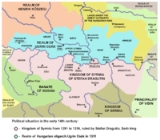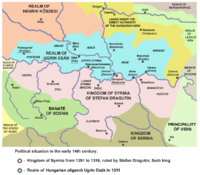
Ugrin Csák
Encyclopedia

Ugrin Csák as an oligarch
In the beginning of the 14th century, after the last King of Hungary from the House of Árpád on the male line died in 1301 a brief period of interregnumInterregnum
An interregnum is a period of discontinuity or "gap" in a government, organization, or social order...
followed. During this period, many Hungarian nobles assumed regal rights for themselves and gained power to the point of becoming oligarchs (powerful barons) and extended their local jurisdiction and influence over large territories, with their own private armies, administration and juristic systems. Some of them felt strong enough not to accept the rule of king Charles I of Hungary
Charles I of Hungary
Charles I , also known as Charles Robert , was the first King of Hungary and Croatia of the House of Anjou. He was also descended from the old Hungarian Árpád dynasty. His claim to the throne of Hungary was contested by several pretenders...
over them.
Ugrin Csák
Csák (family)
Csák was the name of a gens in the Kingdom of Hungary. The Gesta Hunnorum et Hungarorum records that the ancestor of the family was Szabolcs, son of chieftain Előd, the leader of one of the seven Magyar tribes. The family was probably connected to the Árpád dynasty...
was one of these oligarchs, who ruled over present-day region of Syrmia
Syrmia
Syrmia is a fertile region of the Pannonian Plain in Europe, between the Danube and Sava rivers. It is divided between Serbia in the east and Croatia in the west....
and parts of present-day regions of Slavonia
Slavonia
Slavonia is a geographical and historical region in eastern Croatia...
and Bačka
Backa
Bačka is a geographical area within the Pannonian plain bordered by the river Danube to the west and south, and by the river Tisza to the east of which confluence is located near Titel...
, and later also over part of Banat
Banat
The Banat is a geographical and historical region in Central Europe currently divided between three countries: the eastern part lies in western Romania , the western part in northeastern Serbia , and a small...
. His residences were in Újlak
Ilok
Ilok is the easternmost town and municipality in Croatia. Located in the Syrmia region, it lies on a hill overlooking the Danube river, which forms the border with the Vojvodina region of Serbia. The population of the town of Ilok is 5,036, while the total municipality population is 6,750...
(Ilok) and Pozsega (Požega). After Ugrin Csák died, in 1311, the territory under his control was placed under direct control of king Charles I of Hungary
Charles I of Hungary
Charles I , also known as Charles Robert , was the first King of Hungary and Croatia of the House of Anjou. He was also descended from the old Hungarian Árpád dynasty. His claim to the throne of Hungary was contested by several pretenders...
. This extension of his personal territory, helped the king of the Kingdom of Hungary
Kingdom of Hungary
The Kingdom of Hungary comprised present-day Hungary, Slovakia and Croatia , Transylvania , Carpatho Ruthenia , Vojvodina , Burgenland , and other smaller territories surrounding present-day Hungary's borders...
to defeat other local oligarchs.

